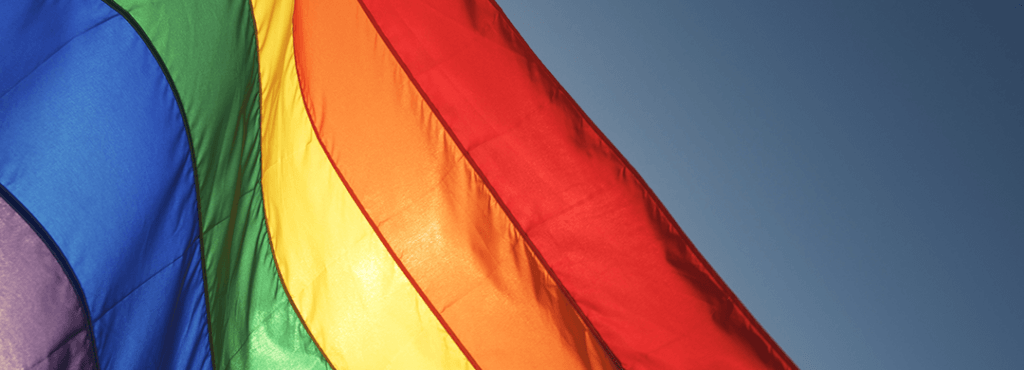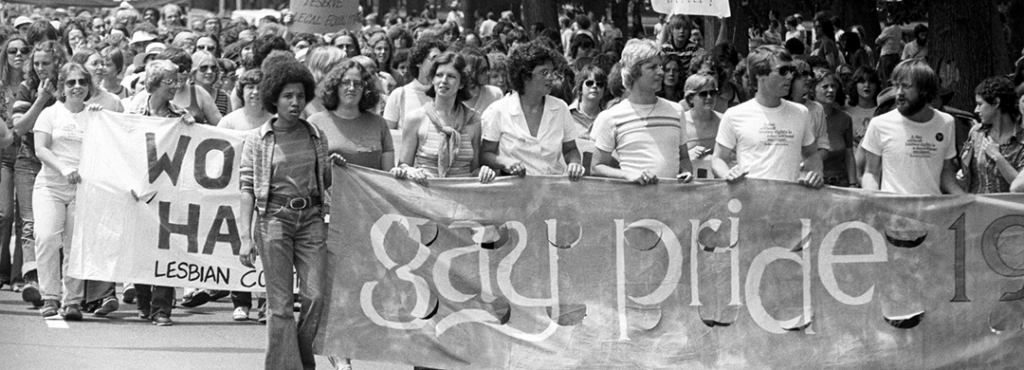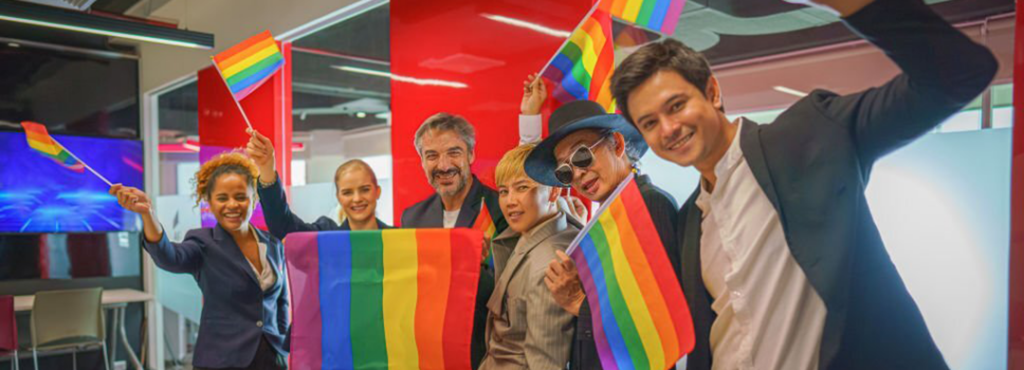Você sabe a importância do Dia Internacional do Orgulho LGBTQIA+?

No dia 28 de junho é comemorado o Dia Internacional do Orgulho LGBTQIA+, neste artigo você entenderá o porquê devemos falar desse tema para além das datas comemorativas.
O Brasil é um dos países mais diversos do mundo, entretanto, os dados revelam informações preocupantes em relação à segurança e ao direito à existência da população LGBTQIA+.
Em 2020, a Antra (Associação Nacional de Travestis e Transexuais) elaborou um documento que mostrava que o Brasil ainda é um dos países mais violentos para pessoas trans no mundo.
Todo esse cenário social reforça a importância de ampliar o diálogo sobre o tema e expandir ações que garantam urgentemente o acesso a direitos básicos da população LGBTQIA+.

O Dia Internacional do Orgulho LGBTQIA+ e a luta histórica por respeito a diversidade
O movimento pelos direitos da comunidade LGBTQIA+ tem se organizado há décadas, não apenas no Brasil, mas em diversas partes do mundo. Em qualquer parte do planeta, a bandeira é a mesma: construir uma sociedade mais respeitosa para toda comunidade.
Assim como no Brasil, grupos começaram a se organizar em diversas partes do globo. Um dos episódios mais importantes começou nos Estados Unidos, em junho de 1969, com as Revoltas de Stonewall, que marcou não apenas aquela década, mas toda uma geração de pessoas que partilham da mesma luta.
Na cidade de Nova York, era comum que a comunidade enfrentasse batidas policiais, mas em raros casos havia uma resistência. Até que um grupo decidiu reagir à truculência no bar gay Stonewall Inn e esse momento desencadeou uma mudança sem precedentes, esse é um marco histórico que contribuiu para que os grupos resistissem aos abusos e discriminação.
Para trazer uma dimensão do quanto a sociedade era conservadora nessa época, nos EUA até 1960, havia uma legislação anti-LGBT que criminalizava o afeto entre pessoas do mesmo sexo.
As penalidades podiam variar de prisão perpétua, castração, choque elétrico, lobotomia e cirurgias que retiravam parte do cérebro do paciente.
No Brasil, o cenário não era diferente: o conservadorismo e o preconceito também marcaram a nossa história. Na década de 70, o movimento LGBTQIA+ ganhou corpo e passou a se articular.
São Francisco, a capital da Diversidade
A cidade de São Francisco é a 7ª cidade mais populosa dos EUA e a 18ª mais rica do mundo. É conhecida mundialmente por dois grandes movimentos culturais: o movimento Hippie e os grupos em defesa dos direitos da comunidade LGBTQIA+.
Para essas comunidades, a cidade serviu de inspiração para a liberdade de expressão e o engajamento social em causas progressistas.
Nos anos 70, São Francisco viveu um momento de grande migração, a região da rua Castro ficou conhecida internacionalmente como “a Meca Gay”. Hoje, a população homossexual da cidade é de 15%, maior do que qualquer metrópole americana.
Como nasceu o Movimento LGBTQIA+ no Brasil?
A luta da população LGBTQIA+ no Brasil surgiu num momento histórico emblemático em meio a onda de repressão e injustiça social que tomou conta do Brasil durante os anos de chumbo da Ditadura Militar.
Esse período começou em 1964 e durou 21 anos. Nessa época, surgiram publicações conhecidas como os jornais Lampião da Esquina e ChanacomChana, ambos foram essenciais para o crescimento e o amadurecimento do movimento no Brasil.
O jornal Lampião da Esquina surgiu no ano de 1978 e tinha um cunho abertamente homossexual, apesar de abordar também outras importantes questões sociais. Uma de suas principais ações era denunciar a violência contra a população da comunidade.
Três anos depois, em 1981, um grupo de lésbicas fundou o jornal ChanacomChana, vendido e distribuído no Ferro’s Bar, conhecido bar de público lésbico. Não aprovada pelos donos do bar, as mulheres foram expulsas em 1983, resultando em um ato político que deu origem ao que ficou conhecido como o Stonewall brasileiro.
Por conta desse levante, que resultou no fim da proibição da comercialização do ChanacomChana, o dia 19 de agosto é considerado um marco em que se comemora o Dia do Orgulho Lésbico em São Paulo.
Movimento LGBTQIA+: um breve raio-X do Brasil
Ao longo dos anos, o Movimento LGBTQIA+ tem lutado por direitos fundamentais para qualquer ser humano, mas infelizmente, essas questões ainda não são tangíveis para milhares de pessoas. Dentre as reivindicações, pauta-se direitos básicos como: segurança, emprego, registro civil, e luta contra preconceitos, como homofobia, lesbofobia e transfobia.
A importância desse tema é indiscutível, inclusão e diversidade são assuntos que não podem mais esperar.
Dados históricos: O que mudou até aqui?
Para se ter ideia, até 1990 a homossexualidade era considerada doença pela OMS e era “tratada” com métodos como: tortura, castração, terapias de choque e até mesmo estupros “corretivos”.
- Em média 207 pessoas LGBTQIA+ foram assassinadas ou se suicidaram em decorrência de crimes de ódio no primeiro semestre de 2021.
- Um levantamento feito em 2020 mostra que o Brasil é o país que mais mata transexuais no mundo.
- A expectativa de vida das pessoas trans é extremamente baixa, em média vivem até os 35 anos.
- A homossexualidade ainda é criminalizada em 72 países.
Como você viu, essa é uma luta legítima de décadas! O mundo tem presenciado avanços, mas ainda há muito para se fazer. Não é preciso fazer parte da comunidade para se sensibilizar com a pauta.
Não dê #closeerrado!

A causa LGBTQIA+ nas empresas
Esse cenário histórico marcado por conservadorismo e preconceito criou ambientes de trabalho extremamente desiguais e uma parte da população LGBTQIA+ ainda enfrenta grandes barreiras para ter oportunidades de trabalho.
Os dados mostram que estamos longe do cenário ideal de um ambiente respeitoso e acolhedor para todas as pessoas. O que a comunidade busca não é privilégio, mas sim inclusão, só assim, teremos de fato empresas conectadas com a diversidade da população brasileira.
Entenda melhor a situação da comunidade LGBTQIA+ atualmente:
- A estimativa é que apenas 4% da população trans do Brasil tenham empregos formais com possibilidade de promoção e progressão de carreira.
- Menos da metade dos trabalhadores LGBTQIA+ relatam a orientação sexual no ambiente profissional.
- Cerca de 65% dos gays já testemunharam homofobia no ambiente de trabalho.
- Dados mostram que 38% das empresas têm restrições para contratar pessoas LGBTQIA+.


